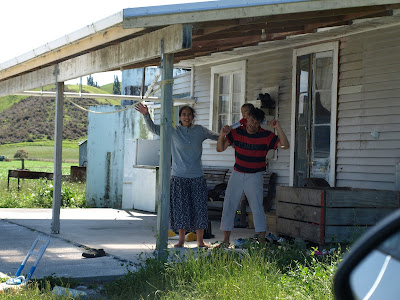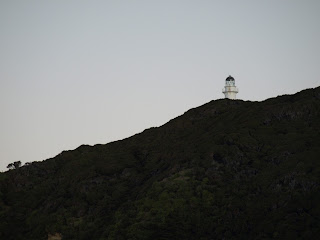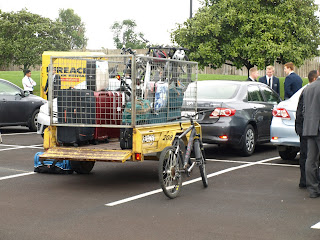Kia ora! Our excellent adventure continues with some thoughts
concerning being remembered. I believe that it would be a very rare person who
would not wish to be remembered. Perhaps we hope that after we depart this life,
friends and family will miss our presence and remember us fondly. We appreciate
the thoughtfulness of a birthday greeting knowing that someone has been
reminded of our special day. We yearn to be remembered fondly for the good
things that we have accomplished and often pray that others may develop short
memories concerning the not-so-stellar things we have done. This time of the
year engenders feelings concerning both sides of the same coin. We are grateful
to be remembered but also take special care while remembering to think of
others.
At this moment, we are overwhelmed by the evidence that so
many of our friends have remembered us this holiday season. Two weeks ago, a
box arrived from America
and Ward and I, having a pretty clear idea of what it held, were in awe
concerning both the size of the box and its weight. This box is an annual
tradition in our home ward in Salt
Lake City . Each year, well before Christmas, the
relief society begins accepting donations that will ultimately end up filling
the Christmas stockings that are sent to all of the missionaries who are
serving from our ward. One of the very
talented women in our ward hand crafts beautiful Christmas stockings that are
then filled with the donations. It may sound greedy to admit that we have grown
very fond of this tradition as this is the fourth time that we have received
one of these packages. We are not ashamed to confess that we are as excited
about our fourth box as we were about our first. We are aware that not only are the people of
our ward generous, but they very often put great thought and effort into
individualizing the gifts for a specific receiver. It touches our hearts to
know that in the bustle of the season, someone has taken extra care to include
a card, gift or simply a note that is personally directed towards us. As I
opened the box, I tried very hard not to look specifically at any of the gifts
or to access the size of any of the envelopes. I filled our stocking then
placed the rest of the items from the box under our little tree. Most of the
gifts were wrapped, but the inclusion of two brightly colored yo yos speaks to
the fact that someone knows us (or Ward) well enough to be confident that we
will put them to good use and have a wonderful time learning a few tricks. We
will have to remember, however, to avoid practicing our yo yoing near plate
glass windows or very small children!
Over the years, I have almost always contributed to the
stockings in one form or another. But to be truthful, and I always try to be, I
will say that until I was actually the recipient of one of these stockings, I
did not fully appreciate what it would mean to the receiver to have one of
these boxes appear . It is a touching and very tender moment when that carton is
opened and all of the love that fills it becomes visible. From now on, when
it’s time to fill stockings for others, I will take more care in finding
something that will suit the person for whom it’s intended. I have learned to
be more thoughtful and to be more creative in my gifting. I now more fully
understand what it means to be so far away from home and know that I am
remembered. Being remembered, I believe, is the next best thing to actually
being home to share the season in person.
Ward and I have a rule; well I have a rule and Ward accepts
it, that we won’t peek or unwrap anything until Christmas Eve, when we will
open the gifts under the tree, saving the filled stocking for Christmas day.
So, we haven’t any idea what surprises await us, if you don’t count the yo yos
and that one bag of holiday mints that we just couldn’t resist. We appreciate the
other cards and parcels that have arrived displaying American postage and we
are grateful for the miracle of technology which has enabled so many of you to convey
your greetings to us electronically.
On a very sweet side note, Sister Saunders, who works in the
mission office, has kept track of all of the packages that have arrived for
each missionary. In that process, she has also kept a running account of the
missionaries who have not received, or most likely will not receive any kind of
remembrance. With the help of others, she is filling forty stockings with
donated items so that each missionary will be remembered next week. We are happy that we will be able to donate a
box of beautiful mandarins freshly picked from the trees in our backyard. It is
my guess that it won’t matter much to each of these young people so far away
from home, that there are any particular items in their stocking. Rather, it
will simply matter that they were remembered. And long after the specifics of
what was filling those stockings is lost to memory, the knowledge that someone
remembered will always be with them.
As always, we are happy and trying to work hard. We are
grateful to be remembered, but ever more grateful to cherish the memories we
have made together. We think of you often and want you to know that we
remember. Being remembered, I think, is one of the greatest gifts we can
receive. We are also mindful of the Reason for the season and are reminded that
if you take away the “mas” from the spirit of Christmas, you are left with the
spirit of Christ. Merry Christmas and Happy Holidays to everyone!
Love, Ward and Susan
Elder and Sister Belliston, serving in Gisborne , New Zealand
The Box
Our Stocking
What didn't fit in the stocking was placed under the tree.















































